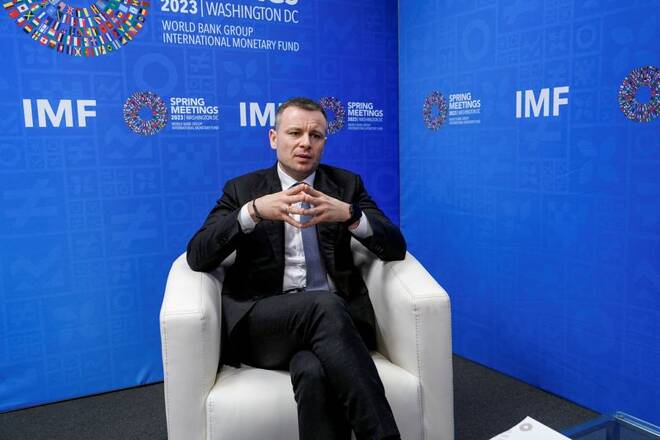Advertisement
Advertisement
Ukraine’s Marchenko says G7 support crucial for ‘longer’ war with Russia
By:
By Andrea Shalal and Jorgelina do Rosario
By Andrea Shalal and Jorgelina do Rosario
WASHINGTON (Reuters) – A new international economic support package of $115 billion gives Ukraine more confidence that it can prevail in battling Russia’s invasion, amid growing recognition that the war could continue for longer than expected, Ukrainian Finance Minister Serhiy Marchenko said on Saturday.
Marchenko said Group of Seven (G7) finance ministers assured him during this week’s International Monetary Fund and World Bank meetings in Washington that they will support Ukraine for as long as needed, a shift from last year, when there was more pressure for Ukraine to agree to end the war.
He said the fresh pledge of economic support – unlocked by a new four-year, $15.6 billion IMF loan – was “tremendously” important for Ukraine, now in a second year of war after Russia’s invasion on Feb. 24, 2022.
“It helps us tremendously because it provides certainty that the IMF, together with G7 nations and supporters of Ukraine, will step in with money to cover our needs for four years,” he said. “Compared with the last spring meetings, I’m feeling more confident that we can prevail in this war.”
“Financial support is very necessary, as well as military support,” he said, acknowledging growing acceptance that the military conflict could drag on.
“We should be ready that this war will last longer than we expected,” he said, noting that G7 partners were no longer pushing Ukraine to accept an end to war – as they had last year – but were now signaling their support for a longer conflict.
Marchenko underscored Ukraine’s appreciation for U.S. economic and military support – some $50 billion since the start of the war – and said he was confident the U.S. Congress would maintain bipartisan support for Ukraine, despite calls by some Republicans to scale back funding.
He also underscored the urgency to begin some reconstruction, including energy infrastructure, roads, schools and housing, and that Ukraine needed to expand its capacity to absorb funding. He said one key step would be development of war insurance, something already underway with the World Bank’s Multilateral Investment Guarantee Agency (MIGA), to reassure global companies to participate in rebuilding the country – an undertaking estimated to cost at least $411 billion.
On over $20 billion of debt owed to overseas bondholders, the minister said that he is not yet in talks on whether to extend a two-year debt moratorium agreed in August.
“It is necessary to protect the reliability of the markets for future reconstruction,” he said. “We will have time to find a solution.”
Marchenko said there was also growing openness among donor countries to explore using Russia’s frozen assets to pay for Ukraine’s reconstruction than even six months ago.
“Our partners are thinking about the possibility of using Russian assets as a necessary tool to support Ukraine. They don’t want to wait until the war ends, they want to find a solution faster,” he said.
Marchenko said U.S. Treasury officials had told him the United States had a low amount of Russian assets, but the issue was of greater concern in Japan, Switzerland and EU countries. He said G7 officials had told him they were broadly supportive of finding a way to utilize Russian assets, but still needed to find a legal solution to “a very complicated question.”
U.S. Treasury Secretary Janet Yellen on Saturday cautioned in an interview with CNN there were legal constraints on using frozen Russian assets to pay for damage to Ukraine.
Marchenko also said there were intense discussions about financial stability during the week’s meetings after the collapse of two U.S. banks and one Swiss bank last month, but he saw no signs of spillover on the Ukrainian banking sector.
(Reporting by Andrea Shalal and Jorgelina do Rosario; Editing by Andrea Ricci)
About the Author
Reuterscontributor
Reuters, the news and media division of Thomson Reuters, is the world’s largest international multimedia news provider reaching more than one billion people every day. Reuters provides trusted business, financial, national, and international news to professionals via Thomson Reuters desktops, the world's media organizations, and directly to consumers at Reuters.com and via Reuters TV. Learn more about Thomson Reuters products:
Latest news and analysis
Advertisement
